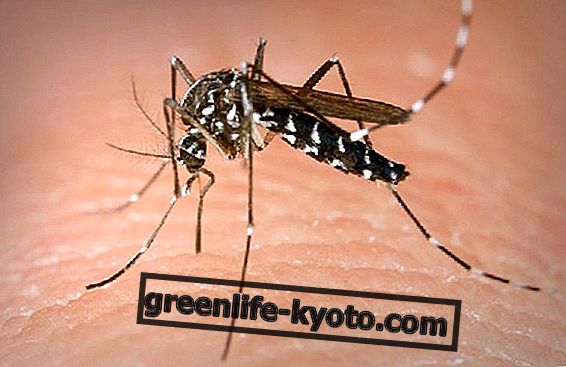Sneezing, red eyes and irritated nostrils: allergy is an unwelcome guest who enters without knocking on the door. To invite him to enter, in a certain sense, is the immune system, which reacts disproportionately to certain substances known as allergens . Let's find out better.
>
>
>
>
How allergy symptoms develop

Allergy derives from two Greek words: allos which means "different", ergon which means "effect" . The lexical combination refers to the spontaneous and exaggerated reactivity of the organism of the allergic subject to particular substances, which are instead harmless in 80% of the population. The terms hypersensitivity and allergy are commonly used as synonyms.
Symptoms of allergy
The symptoms of allergy can be different, depending on the trigger, and can occur with varying intensity.
The most common ones are:
- stuffy nose
- itchy nose, throat, mouth and lips
- itching and redness of the eyes with swollen eyelids and tearing
- runny nose and sneezing
- itchy skin with rashes and redness
- diarrhea associated with stomach pain, nausea and vomiting
- cough, shortness of breath, wheezing and asthma
Causes of allergy
Allergic diseases are atopic diseases whose characteristic is the presence of a particular class of specific antibodies (IgE) . Atopy means the hereditary tendency for immediate hypersensitivity reaction to IgE antibodies.
The allergy is therefore caused by an excessive response of the immune system to particular substances known as allergens .
The allergen is a substance endowed with antigenic power, that is, such as to cause the production of antibodies when it enters the body.
Allergens can cause an allergic reaction by entering the body in different ways:
- most commonly by air (such as dust and pollen),
- via food,
- topically,
- by injection.
The most common allergens in nature include:
- globular pollen proteins (male element necessary for plant reproduction),
- insect poisons,
- dust mites,
- mycophytes (molds and yeasts),
- certain foods,
- some drugs.
In reality, therefore, we cannot speak of allergy, but rather of diversified allergic forms .
Diagnosis for allergy
The diagnosis for different allergic forms is commonly made with the Prick Test . This is a skin test by which, through small incisions, a minimal amount of an allergen comes into contact with the skin.
In the event of a reaction, such as localized swelling or itching, in correspondence with one or more incisions, then the patient is allergic to the corresponding allergen. This means that it has IgE antibodies active against that allergen.
There are also other tests, depending on the type of allergy to be diagnosed, such as the RAST test that directly looks for IgE antibodies in the blood and the Patch test, used mostly for the diagnosis of allergic contact dermatitis.
Discover nickel-free cosmetics, a metal found in cosmetics that can be caused by allergic dermatitis
CARE FOR ALLERGY
Nutrition in case of allergy
The most common allergenic foods are milk, eggs, crustaceans and molluscs, nuts, wheat, soybeans and chocolate .
In order to ascertain the reaction to one food rather than another, there are so-called provocative food tests which consist in ingesting suspect food and are performed when the symptoms that occur regularly are related to certain foods and food additives.
More and more often, however, pollen allergies are associated with intolerance towards certain types of fruit or vegetables. An apple, for example, can be dangerous for those who are allergic to birch and melon instead for those who are sensitive to grasses. These cross-allergies can sometimes be curbed by cooking the fruit.
Recent studies would also highlight the beneficial effects of probiotics to prevent allergies in children.
Phytotherapy
The world of nature puts at our disposal the so-called adaptogens, so called because they allow to increase the resistance and the ability of adaptation of the organism to the stressing agents and to the unfavorable conditions of any origin, through a complete cellular nutrition, being able to act not on the symptoms but on the causes that can give rise to imbalances.
We remember some of the most effective and important ones: ginkgo, rodiola, guarana, eleuterococco .
You can learn more about the properties and uses of plants and medicinal herbs

Bach flowers for allergy
Bach flowers harmonizing and balancing the emotional-anxious and irritating aspect that often accompanies allergic syndromes can be of great help for all these pathologies. Two flowers are particularly useful in this sense:
- Beech, which acts on the emotional aspects of both food allergies and intolerances towards any other substance;
- Chicory , extremely indicated in allergic syndromes related to bronchial asthma.
The Chicory type in particular, is afraid of losing love and consequently lives his love for people and things with a strong attachment. The analogy with his suffocating way of loving reminds us that this remedy is useful precisely in case of allergy and bronchial asthma.
Traditional Chinese Medicine
In traditional Chinese medicine (TCM), in the case of allergies, there are two organs in a state of inadequate balance: liver and lung . Seasonal respiratory-ocular allergy is the expression of a weakness in pulmonary energy concomitant with an excess of liver energy . In the spring, for acupuncture, the liver is physiologically at the most of its functional expression while the lung, organ of autumn, is in a natural moment of slight fragility.
A defensive energy deficit ( Wei Qi) of the Kidneys and Lungs is also accompanied by a deficit of the Governor Vessel ( Du Mai ) together with a chronic presence of Vento in the nose.
From traditional Chinese medicine, medicinal mushrooms also come to the rescue, thanks to their anti-inflammatory, antihistamine and lung re-oxygenation properties, they are useful for treating allergies.
Discover also natural remedies for dog and cat allergies
Essential oils in case of allergic syndromes
In the case of spring allergies, various essential oils can be used, such as Roman chamomile oil, eucalyptus essential oil, lavender essential oil which is analgesic, antibacterial, antifungal, anti-inflammatory, antiseptic, antispasmodic, calming, sedative, carminative, healing. Furthermore, the essential oil of lemon and the essential oil of rose damascena or centifolia .
Homeopathy
In the case of an allergic syndrome crisis, a route must be taken together with the homeopath to investigate causes and solutions. The most administered homeopathic remedies, especially in case of pollen allergy, are Allum cepa 5 CH, in case of sneezing and runny nose; Ipeca 5 CH, in case of deep and dry cough; Euphrasia 5 CH in case your eyes are watering. They take 5 granules one or more times a day until the symptom improves.
Exercises
Sedentariness is harmful in any case, even in allergic subjects. Sports activity is also recommended for people with breathing difficulties due to allergies; it is better to prefer disciplines that require constant effort such as swimming, a sport in which the increase in pulmonary ventilation is moderate and is achieved with a respiratory rate that is not high and subject to technical action).
Even yoga when you are allergic can be practiced: with due care, it can help make you live more serenely with the very unpleasant allergies.












